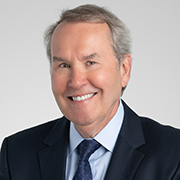
In this special Lifetime Achievement Award Spotlight, we asked this year's recipient Randall C. Starling, MD, MPH, FACC, FAHA, FESC, FHFSA to share career highlights, opinions on the future of heart failure care, and his professional advice on entering a career in the field of heart failure.
Dr. Starling will receive the award at the HFSA Annual Scientific Meeting 2023 on Saturday, October 7. Learn more >>
Read Randall Starling's full bio >>
Q&A
Please share with us some “highlights” from your distinguished academic career that have significantly impacted the field of heart failure.
Working with some of the leaders and icons in medicine has been the greatest highlight of my career. As a medical student I was exposed to Sol Sherry who championed the use of thrombolytic therapy, and Wilhem Kolff and his son, who both exposed me to mechanical circulatory devices. As a third-year medical student my intern, Doug Mann, became a future HFSA president and has been a lifelong mentor. During internal medicine training I worked alongside Thomas Starzl and Bartley Griffith and watched firsthand as human cardiac transplantation emerged. My cardiology training exposed me to my mentor Carl Leier, a founding member of HFSA, and the person that brought dobutamine to clinical practice. Again, I was exposed to mechanical circulatory support, Robert Jarvik brought the TAH to Ohio State, and we used it in our patients 35 years ago. Next on to the Cleveland Clinic and working with icons including Eric Topol, Gary Francis, and James Young. Another highlight was being associated with the NIH HF Network and working closely with Eugene Braunwald. Being associated with these “giants” and many others has been an inspirational highlight of my career. My greatest satisfaction has been helping to train numerous heart failure fellows, watching them mature, and become the future leaders in heart failure clinical care, leadership, and research globally.
In your opinion, what are important next steps in research to improve heart failure care?
I think the combination of devices, AI, and empowering patients to participate in their care will be the major advances in the next decade. Remote care, and patient monitoring tools incorporated into electronic medical records will pave the way. Implementation science should lead the way to assure the seminal scientific discoveries are able to impact the lives of HF patients. Research in these domains will be essential.
Over the years, you have served in many key and critical roles within the Heart Failure Society of America. What do you consider to be some of the pivotal activities that you have led within our Society?
Expanding the horizons of HFSA and including our international colleagues, societies, and members, into the HFSA fabric and collaborative projects has been pivotal. The honor to serve as HFSA President for 1 year, and to help HFSA members advance to leaderships roles has been most rewarding.
What do you think are new opportunities to grow the Heart Failure Society of America that will enhance its role as a leader amongst professional societies engaged in heart failure education, research, advocacy, etc.?
The future is with the new and emerging leaders and giving them the opportunity to lead us all into the future. HFSA has embraced the newest generation of members and provides a forum for members at all career levels and disciplines to convene and collaborate. HFSA is a leader in fostering a membership and leadership that embraces diversity of professional members from all disciplines and importantly those we serve, patient members.
What advice do you have for early career professionals who are entering the field?
Networking is the key to developing a career. Most of us do not succeed in isolation but are most successful and thrive with active collaborations and a network of colleagues.
About the HFSA Lifetime Achievement Award
The HFSA Lifetime Achievement Award is presented by the Executive Council of the HFSA. The purpose of this award is to recognize a lifetime body of work by an individual who has made a significant and sustained contributions to the field of heart failure.
